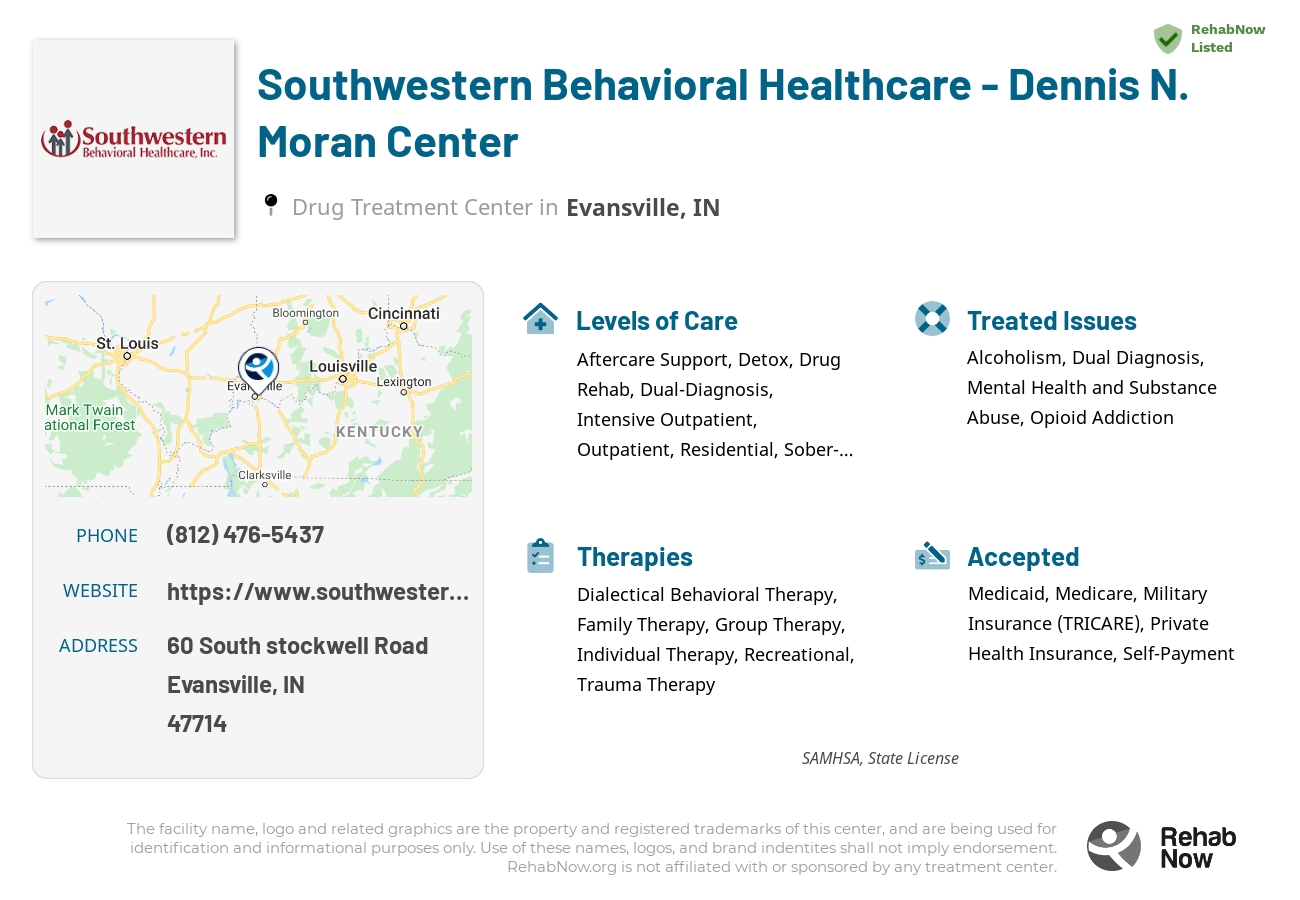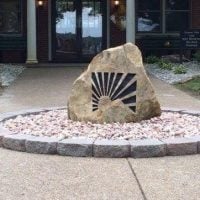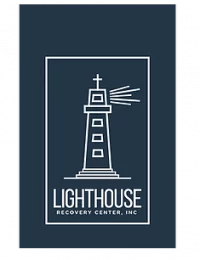Southwestern Behavioral Healthcare - Dennis N. Moran Center
Drug Rehab Center in Evansville, Indiana
Southwestern Behavioral Healthcare - Dennis N. Moran Center in Evansville, Indiana is an Addiction Treatment Facility that offers a range of services such as detox, drug rehab, and outpatient care to help individuals suffering from alcoholism, drug addiction, and mental health issues.
About Southwestern Behavioral Healthcare - Dennis N. Moran Center in Indiana
Southwestern Behavioral Healthcare - Dennis N. Moran Center, located in Evansville, Indiana, specializes in outpatient services for individuals grappling with alcohol, drug, gambling addictions, and other mental health issues. With a focus on minimizing disruption to family life, the center crafts personalized treatment plans that may include individual, group, and family therapy, alongside medication if required.
- Personalized Treatment Plans: Tailored to meet each patient's specific needs, incorporating a variety of therapeutic methods.
- Outpatient Specialty Groups: Evolving groups designed for individuals seeking support in areas such as anger management, grief, and trauma.
- Focus on Family: Strives to treat patients in an outpatient setting to maintain family cohesion during recovery.
Accredited by SAMHSA and holding a valid State License, Southwestern Behavioral Healthcare - Dennis N. Moran Center prioritizes high-quality care through its various accredited programs. The center accepts Private Health Insurance, ensuring a wide range of individuals have access to their services.
Specializing in treating addictions to alcohol, opioids, and drugs, as well as addressing dual diagnosis and mental health issues, the center employs a comprehensive approach. Treatment methods include cognitive behavioral therapy, medication management, and holistic approaches, offered across different levels of care such as intensive outpatient and residential programs.
Genders
Ages
Modality
Additional
Accreditations
State License
SAMHSA
Conditions and Issues Treated
Opioid addiction has become a significant health problem in the United States. When a person’s life becomes unmanageable because of an opioid addiction, treatment can help them get sober. Treatment includes medical care and counseling.
“With so many people struggling with opioid addiction, we need more care and attention for those who want to quit. Opioid addicts often take opioids when they experience a painful injury – that’s how the cycle starts! When someone begins taking their medication differently than prescribed or takes an excessive amount of drugs, it means they’re hooked on drugs and in danger of overdosing.
The most successful way to beat this is through detoxing from these types treatments at Southwestern Behavioral Healthcare - Dennis N. Moran Center in . Most facilities start by using medical support during the process while providing counseling services; rehabilitation comes later on after treatment has been completed successfully.
A “dual diagnosis” is when the individual has two medical issues at the same time. The top co-occurring mental disorders with addiction are depression, anxiety, ADHD, bi-polar disorder. Addiction is also considered a mental illness that is not a choice but rather a medical condition. Addiction can be caused by any number of underlying issues.
Dual diagnosis is provided by Southwestern Behavioral Healthcare - Dennis N. Moran Center to treat addictive tendencies as well as any untreated mental illnesses. This ensures successful long term health and recovery for patients after treatment has been completed.
Dual diagnosis is provided by Southwestern Behavioral Healthcare - Dennis N. Moran Center to treat addictive tendencies as well as any untreated mental illnesses for people in Indiana. This ensures successful long term health and recovery for patients after treatment has been completed.Levels of Care Offered
This center offers a variety of custom treatment tailored to individual recovery. Currently available are Aftercare Support, Detox, Drug Rehab, Dual-Diagnosis, Intensive Outpatient, Outpatient, Residential, Sober-Living / Half-Way, with additional therapies available as listed below.
The first level of recovery is detox. It involves giving a person the opportunity to get the toxins out of their body safely. The individual receiving treatment at Southwestern Behavioral Healthcare - Dennis N. Moran Center typically will get ill during detox, and they will often start using again to get rid of unpleasant emotions and complicated physical responses. It is why having a Indiana medical professional present is so critical. A medical professional can make sure that patients do not start using again during detox and stay physically healthy during the process. They will also have treatment on a mental level to relieve their symptoms and guide them through the process.
Outpatient addiction treatment is beneficial for people who are able to function well in their day-to-day lives. It is recommended for people who are not yet ready to end their relationships with friends or family members who might be encouraging drug and alcohol use.
Intensive outpatient treatment is beneficial for:
- People who are able to attend treatment more than 3 times per week.
- People who do not meet the criteria for inpatient treatment.
- People who are able to contribute to their own recovery outside of the treatment center.
- People who are motivated towards recovery.
- People who are able to overcome addiction on their own without the need for higher levels of care.
Outpatient programs at Southwestern Behavioral Healthcare - Dennis N. Moran Center, the Evansville resident can live with their family while continuing with their job or studies. Treatment includes educating the patient on drug abuse, medications, and counseling sessions at the individual or group level. Outpatient treatment plans cover diagnosis, detoxification, management, and counseling. They are a popular option for those who have graduated from inpatient facilities.
Sober living homes (abbreviated SLHs or sometimes sober houses ) are temporary housing for recovering addicts, most often those in early or mid stage recovery, who typically live in the home for 3 to 6 months.
The typical SLH functions as a halfway house, providing a stable living environment for addicts in recovery.
While at an SLH, residents typically meet with various therapists on site and attend regular 12-step meetings as well as other recovery group meetings.
Residential treatment programs are those that offer housing and meals in addition to substance abuse treatment. Rehab facilities that offer residential treatment allow patients to focus solely on recovery, in an environment totally separate from their lives. Some rehab centers specialize in short-term residential treatment (a few days to a week or two), while others solely provide treatment on a long-term basis (several weeks to months). Some offer both, and tailor treatment to the patient’s individual requirements.
Without aftercare support, addicts can easily relapse back into addiction. It is crucial to integrate the addict back into society. Aftercare support should take place after outpatient treatment has ended.
There are a few different types of aftercare support that patients can seek after completing an inpatient treatment program:
- 12 Step Self-help groups (AA, NA)
- Therapeutic communities,
- Long-term, structured sober living arrangements
- Halfway houses (residential treatment centers)
Many different support groups exist for addicts to seek help after treatment. Some are more effective than others, depending on the person’s addiction, background, and other factors.
Therapies & Programs
Individual therapy is a form of counseling where you meet with a trained professional one-on-one. Meeting with a therapist in this setting allows for a personal and trusting relationship to be built. This allows the patient to open up about sensitive or private issues they may not feel comfortable discussing in a group. Individual therapy helps identify the root causes of your addiction, which can help prevent relapse.
Family therapy is often done alongside drug treatment to help addicts stay sober. The goal of family therapy for drug addiction is to create an environment where communication can happen without judgment, hostility, or blame. The therapist will sit with the family so they can learn how to communicate differently and provide new tools for dealing with emotions so that people don’t want to drink or do drugs. It’s important for families to focus on relapse prevention plans during treatment so that if the addict feels like they want to use again, they’ll know what steps they need to take together to prevent it from happening again in the future.
Group therapy sessions are another common addiction recovery service. These group sessions typically involve six to 12 addicts who meet regularly with a trained professional for support and guidance.
During these sessions, the group shares their experiences with one another and provides feedback that can help each member avoid relapse or overcome specific obstacles they are facing in their recovery process. With this type of support and guidance, addicts can feel like they are part of a community that understands their struggles and will help them get through the hard times.
Many people struggling with drug addiction have experienced some form of trauma in their lives. It is crucial that these individuals seek out professional help; otherwise, their drug abuse and addiction will likely continue.
Therapists and counselors at drug treatment centers employ several treatment programs to help people struggling with drug addiction, including trauma therapy. Trauma therapy helps people dealing with addiction by allowing them to confront the traumas of their past and move past them.
It is important to note that trauma therapy should not be confused with PTSD (post-traumatic stress disorder). Rather, it is used to treat the effects of trauma, which are often at the root of addiction.
Dialectical Behavior Therapy was developed in the 1980s to treat chronically suicidal individuals. It is a cognitive-behavioral therapy that combines standard DBT with strategies derived from Zen Buddhism, such as mindfulness training.
DBT has been adapted for use with other types of psychiatric problems, including eating disorders, substance abuse disorders, borderline personality disorder, posttraumatic stress disorder (PTSD), and other personality disorders. Dialectical Behavior Therapy is considered a psychosocial treatment of BPD. This means that while it can be used alone or in conjunction with drug treatments, DBT does not rely on medications to treat the disorder. Instead, DBT aims to help patients change their thinking and behavior.
Cognitive Behavioral Therapy (CBT) focuses on the underlying thoughts and behaviors that caused the problem of addiction in the first place and may cause a relapse. Negative feelings are common in drug abuse disorders, but they can lead to co-occurring disorders if not recognized. CBT involves strategies that help to change the behavior pattern by restructuring negative thoughts into positive ones. It helps to remove these feelings, and it provides long-term benefits. Also, CBT promotes self-awareness and self-control. It can be administered as a monotherapy or as part of combination therapy.
CBT can improve the patient’s mood, reduce drug cravings and boost success rates on treatment plans. Regular practice can help individuals handle negative attitudes, thoughts, and feelings without turning to drugs or alcohol. The core belief of Cognitive Behavioral Therapy (CBT) is that one’s moods, behaviors, and actions are all connected. Individuals can improve their quality of life using CBT. It helps addicts understand the patterns of thought and feelings that cause them to use drugs or alcohol and develop a healthy response.
Payment Options Accepted
For specific insurance or payment methods please contact us.
Is your insurance accepted?
Ask an expert, call (888) 674-0062
Southwestern Behavioral Healthcare Associated Centers
Discover treatment facilities under the same provider.
- Southwestern Behavioral Healthcare - Stepping Stone in Evansville, IN
- Southwestern Behavioral Healthcare - Stepping Stone in Evansville, IN
- Southwestern Behavioral Healthcare - Gibson Regional Services in Princeton, IN
- Southwestern Behavioral Healthcare - Moran Center in Evansville, IN
- Southwestern Behavioral Healthcare - Gibson Regional Services in Princeton, IN
Learn More About Southwestern Behavioral Healthcare Centers
Additional Details
Specifics, location, and helpful extra information.
Evansville, Indiana 47714 Phone Number(812) 476-5437 Meta DetailsUpdated April 15, 2024
Staff Verified
Southwestern Behavioral Healthcare - Dennis N. Moran Center Patient Reviews
There are no reviews yet. Be the first one to write one.
Evansville, Indiana Addiction Information
The state of Indiana ranks 14th in the nation for drug abuse, but 17th for drug overdoses. The state has many high-quality rehabilitation centers, but reports show that there are about 20 deaths per 100,000 people. This is due to its location making it a drug trafficking haven, where many drugs are further distributed into the country.
The drug addiction problem in Evansville, IN, is unfortunately quite severe. According to statistics, there were over 1,000 emergency room visits related to drug overdoses in Evansville alone. Cocaine is the most commonly abused drug. Businesses may suffer from decreased productivity and an increase in absenteeism. If you or someone you know is struggling with drug addiction and abuse, drug treatment facilities can provide the help you need to get sober.
Treatment in Nearby Cities
- Rockport, IN (25.4 mi.)
- Kendallville, IN (267.5 mi.)
- Evansville, IN (3.9 mi.)
- Decatur, IN (240.5 mi.)
- Logansport, IN (201.7 mi.)
Centers near Southwestern Behavioral Healthcare - Dennis N. Moran Center
The facility name, logo and brand are the property and registered trademarks of Southwestern Behavioral Healthcare - Dennis N. Moran Center, and are being used for identification and informational purposes only. Use of these names, logos and brands shall not imply endorsement. RehabNow.org is not affiliated with or sponsored by Southwestern Behavioral Healthcare - Dennis N. Moran Center.







